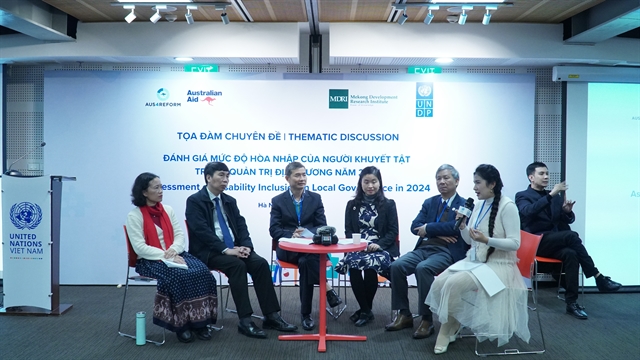 |
| Thematic discussion 'Assessment of Disability Inclusion in Local Governance in 2024' on Thursday, December 12 in Hà Nội. — Photo courtesy of UNDP in Việt Nam |
HÀ NỘI — People with disabilities in Việt Nam face numerous barriers in accessing public services, receiving allowances, using banking services and adapting to climate change.
There is an urgent need to improve online public service portals, consider the abilities and preferences of those with disabilities when implementing methods of receiving allowances at the local level, and implement tailored measures for climate adaptation based on specific disability types.
These findings were discussed on Thursday at the thematic discussion 'Assessment of Disability Inclusion in Local Governance in 2024' conducted by the Mekong Development Research Institute (MDRI) and the United Nations Development Programme (UNDP) in Việt Nam, with support from the Australian Department of Foreign Affairs and Trade (DFAT) through the Việt Nam Provincial Governance and Public Administration Performance Index (PAPI) programme.
MDRI Director Phùng Đức Tùng told the meeting: “It is a crucial and timely study as there has been very little research on the participation and inclusion of persons with disabilities in local governance.”
The study which surveyed 2,310 persons with disabilities from various localities across the country, highlights critical challenges faced in accessing information and responding to natural disasters and climate change.
At the event, Madeleine Plocki, second Secretary Development, Australian Embassy in Việt Nam, said: “People with disabilities are the largest and most disadvantaged minority in the world, representing 15 per cent of the global population. Effectively addressing the needs of those who experience greatest vulnerability, including people with disabilities, provides the bedrock for social cohesion and contributes to resilient and prosperous countries.”
The research findings reveal that among those who performed administrative procedures in the past 12 months, up to 25.6 per cent found it difficult to search for information on online public service portals.
Many online public service portals are not designed to support screen readers, limiting access for persons with visual disabilities.
These findings underscore the need to enhance public service e-portals in compliance with WCAG 2.0 standards and to involve persons with disabilities in the development process of the online public service portal to ensure greater accessibility for them.
One of the most common challenges faced by persons with disabilities in receiving allowances is the reliance on family members to collect them, 52.4 per cent.
As a result, those who suffer from disabilities are often unable to make independent decisions about how to use these subsidies.
Only 24.3 per cent of monthly allowance recipients surveyed currently receive allowances via bank accounts, primarily in the southeast and Red River delta regions.
However, transitioning to this method poses difficulties in rural and remote areas, where the nearest ATM might be 20km far away from the commune People’s Committee.
Banking services are also not easily accessible, as opening a bank account often requires a guardian or witness and many banking applications are not screen reader-friendly, while those with disabilities also face significant challenges in biometric authentication.
These issues highlight the need for policy and service improvements to ensure equal access and convenience for persons with disabilities in receiving allowances and using banking services.
The study recommends considering the abilities and preferences of persons with disabilities when implementing methods for receiving allowances at the local level and developing more accessible processes to allow persons with disabilities to open and manage bank accounts independently and conveniently.
In the past five years, 72.5 per cent of persons with disabilities have been affected by climate change phenomena.
Despite being identified as a vulnerable group requiring special priority, they face significant support gaps due to the lack of specific policies for different types of disabilities and limited financial and human resources of the localities hit by disasters.
Regarding the participation of persons with disabilities in elections, the study also highlights that support needs to be flexible and tailored to the specific characteristics of their disabilities.
Specifically, 22.6 per cent of respondents with hearing and speech disabilities indicated a need for information in accessible formats, while those with visual and physical disabilities require support through more accessible polling options, such as mobile ballot boxes.
Although 72.1 per cent of those surveyed expressed a willingness to vote for candidates with disabilities, 14.7 per cent were uncertain.
This underscores the need to strengthen advocacy efforts to raise awareness about elections and promote the participation of persons with disabilities in the electoral process, ensuring the protection of civil rights and advancing social equality and inclusion.
During the discussion, Sabina Stein, Assistant Resident Representative and Head of the Governance and Participation Unit at UNDP in Việt Nam, emphasised: “These findings make it clear that Việt Nam’s strong legal framework on the rights of persons with disabilities must be matched with practical measures that empower individuals to thrive in a digital society and adapt to climate challenges.” — VNS


